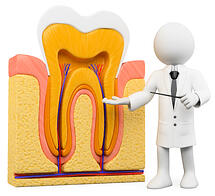By Deborah Pinnock on May 15, 2020 @ 01:30 PM
One of the top questions we receive from our members is about dental cleanings. What often happens is that the patient goes to the dental office for a regular cleaning, only to find out that he or she needs a deep cleaning. Then instead of paying $0 for this cleaning, they now have a bill. Talk about surprised and confused. Well, not you...not anymore. Let’s look at the most common types of dental cleanings and the different signs that you may need them.
Prophylaxis (aka a regular dental cleaning)
A prophylaxis or routine cleaning, as it is commonly called, is a cleaning done to prevent dental problems, such as gum disease or bone loss. Dentists recommend that patients do this cleaning every six months, in addition to keeping up with their personal oral hygiene, to maintain a healthy mouth. Here are some quick facts about a routine cleaning:
- Performed on a healthy mouth (free of gum disease or bone loss)
- Removes plaque (the sticky film that’s always forming on your teeth)
- Removes calculus (plaque that has hardened)
- Removes stains that are on the teeth
- Usually done by a dental hygienist
Periodontal Scaling and Root Planing (aka a deep cleaning)
Periodontal scaling and root planing, otherwise called a deep cleaning, is a non-surgical cleaning done to treat gum disease before it gets out of hand. The root cause of gum disease is plaque. If left unchecked, plaque hardens into calculus or tartar, which is bad news for your teeth and gums.

So, the purpose of this cleaning is to remove tartar build-up from the area between your gums and teeth and from the roots of your teeth. Some warning signs that you may need this cleaning include:
- Your gums bleed when you floss or brush your teeth
- Red, puffy gums
- Tartar has created little pockets between your teeth and gums that house dangerous bacteria
- Your gums are beginning to pull away from your teeth
- Your teeth are becoming loose or falling out
- You may be struggling with bad breath despite your best efforts
Periodontal Maintenance Therapy
Once you have completed a procedure like scaling and root planing or even gum surgery, a prophylaxis, may no longer be enough. So, dentists or periodontists recommend periodontal maintenance. It’s a follow-up cleaning that helps to keep gum disease away. Other things to keep in mind about a periodontal maintenance are:
- It helps disrupt the growth of the bacteria that causes gum disease
- Suggested for people who have had scaling and root planing or gum surgery
- Recommended every three to four months
Debridement
If you have not visited your dentist for a cleaning in a year or more, chances are, you may need a dental debridement. It’s important to know that this is not a cleaning. It’s a procedure that removes heavy build-up of plaque and tartar so that a dentist can accurately assess the condition of your gums, bone and teeth. So, you need a dental debridement if:
- You have not had your teeth cleaned by a dentist in over a year
- You have thick build-up of plaque and tartar on your teeth
- The build-up is not just above your gum line but has gotten below your gum line
Knowing that there are different types of cleanings and understanding when each is needed has many benefits. Based on your dental health and habits, you will have the right expectations when you go to the dentist, avoid financial surprises and most importantly, this knowledge helps you understand that your personal oral hygiene coupled with regular routine cleanings are the most powerful weapons against gum disease.





comments